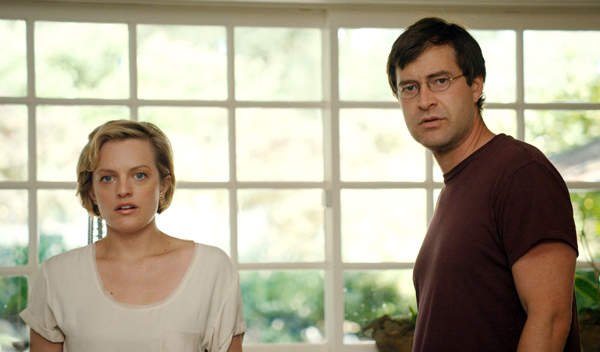This comedy, with a couple of couples who are easily confused in their mixed-up match-ups, owes something to A Midsummer Night’s Dream. To its great credit, it also manages to be nearly as delightful.
Sophie (Elisabeth Moss) and Ethan (Mark Duplass) are a married couple who have lost the magic. A quirky therapist (Ted Danson) suggests they take a weekend retreat to his relationship-rebuilding Shangri-La. Upon arrival, a guestbook full of smiling faces confirms the track record: people fall back in love here.
Things get off to a good start. A bottle of wine and a pot buzz leads to a romantic rendezvous worthy of the good old days. But Ethan has no memory of it the next morning, claiming instead that he fell asleep early. Trouble enters paradise, and what follows is too entertaining to reveal in much detail. Suffice it to say that Sophie and Ethan are presented with a familiar dilemma: Would you, could you, should you change the person you love? Or rather, if an idealized version of your partner showed up at your door, free of the foibles you find irritating and with a much better haircut, who would you take to bed?
In this slick two-hander, the performances of Moss and Duplass are sharp, subtle, and seriously funny in a kind of bizarro Who’s Afraid of Virginia Woolf? Duplass, skilled at playing the straight man, earns most of the laughs with his pitch-perfect timing, while Moss ably gives the story an emotional spine. She’s once bitten twice shy with her husband, and the turmoil she goes through in trying to decide what she wants elevates the piece beyond the simplicity of screwball comedy.
Top-notch direction and editing keep the chaos clear and clever. The way screenwriter Justin Lader sets up this intricate snafu is ultimately more interesting than the way he resolves it, but the film zips through its 90 minutes with consistent surprises and then nails the landing.
The young lovers in Midsummer are enchanted by spells and by their idyllic environment. It’s sometimes forgotten that one of them, Demetrius, remains charmed at the end of the play, as a kind of chemically-induced Stepford husband. His wife, Helena, claims to have found him, “like a jewel, mine own and not mine own.” Is this happily ever after or a tongue-in-cheek takedown of monogamy? Shakespeare never told, and neither does The One I Love.







Leave A Comment